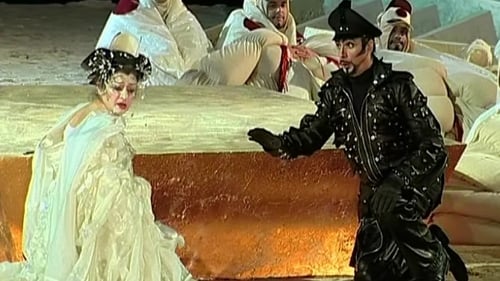
In a city gripped by religious fanaticism, a Jewish goldsmith and his daughter face the perils of being outsiders. A great secret could save their lives - or else bring death and revenge. One of the great achievements of French opera, Fromental Halévy's La Juive was controversial from the start. For some an insult to religion and the state, for others a plea for tolerance, it is above all a human tragedy about a persecuted family. Roy Cornelius Smith and Corinne Winters star in this award-winning production by director Peter Konwitschny.

Ferrando
The Count Di Luna believes that his younger brother was murdered years before by a vengeful gypsy but still hopes that he may be alive. When he attempts to court the beautiful Leonora, he is enraged to discover that she has a lover – the troubadour, Manrico. Manrico and the Count duel, and afterwards Manrico reveals to Azucena, the woman he believes to be his mother, that when he had the opportunity to kill the Count he felt something holding him back.

Himself
The recording took place in Teatro Farnese di Parma, a kind of "mini-Verona" stage, but under roof. Probably good acoustics. But that doesn't rescue this perfomance of the Requiem mass, the fault is mainly being the conductor's, Yuri Temirkanov. He doesn't at all seems inspired of this work and not interested in whats happens on stage, if judged by the video. Particularly, he seems unintersted in the choir. The tenor, Francesco Meli, delivers a very inspired Ingemisco, but the other soloists are probably affected by the conductor.

Mose
This thought-provoking, modern-day interpretation of Rossini's 'Mosè in Egitto' sets the scene for superior music-making at the prestigious Rossini Festival in Pesaro. For conductor Roberto Abbado, the transposition of the action to the present day releases the energy of Rossini's music. At his disposal is a cast of top-quality vocalists such as the “refined bel canto artist(Bresciaoggi) Sonia Ganassi as Elcia, and the “outstanding” Dmitry Korchak as the Pharaoh's son, two lovers fatefully drawn into the political turmoil and catastrophes of their time. Also among the protagonists are the “thoroughly brilliant” (DeutschlandRadio Kultur) baritone Alex Esposito as Faraone and, in his Rossini Festival debut, young, full-bodied bass Riccardo Zanellato as Moses. Conductor Roberto Abbado “inspired his musicians to deliver a spectacular performance” (Salzburger Nachrichten).

I Puritani by Bellini was staged by Francisco Negrín at Het Muziektheater in Amsterdam in 2009, with Mariola Cantarero, John Osborn and the Nederlands Philharmonisch Orkest, conducted by Giuliano Carella.

Recorded live from the Teatro Regio di Parma, 8 October 2011

Zaccaria
Part of Tutto Verdi series - Nabucco (2009) Parma. NABUCCO was Verdi’s third work for the stage and proved his first great success when performed in 1842. It deals with the Hebrew’s attempts to break free from the yoke of their Babylonian oppressors and is nowadays numbered among Verdi’s most popular works, not least on account of its famous Chorus of Hebrew Slaves, which has one of the best-loved melodies in the whole history of opera.

A tragedy through and through, then: intense, deep and profoundly romantic. Anna Bolena is a very significant work in the history of opera, as well as in Donizetti’s own personal history. In this Teatro Donizetti di Bergamo production Dimitra Theodossiou stands out as a fine interpreter both as a singer and as an actress.

Don Alvaro di Castiglia
Wolf-Ferrari’s comic opera La vedova scaltra (The Cunning Widow), is among the works he based on plays by Goldoni. It matches closely the conventions of 18th-century opera buffa in its witty if sceptical look at the mechanisms governing the interplay of human relations. Four hopeful suitors, English, French, Spanish and Italian, vie for the hand of Rosaura, the cunning widow of the title, who disguises herself to meet each wooer, eventually choosing the only one who can demonstrate his sincerity. This production, filmed live at the Teatro La Fenice in February 2007 in celebration of the 300th anniversary of the birth of Goldoni in Venice in 1707, is the first to appear on DVD.

Basilio

Bonzo
Japan, early twentieth century. U.S. Navy Lieutenant B.F. Pinkerton inspects the house he has leased from a marriage broker. The broker, Goro, has procured him three servants and a geisha wife, Cio-Cio-San, known as Madama Butterfly. He is enchanted with the fragile Cio-Cio-San. Cio-Cio-San is heard in the distance joyously singing of her wedding. In a quiet moment, Cio-Cio-San shows her bridegroom her few earthly treasures and tells him of her intention to embrace his Christian faith. The Imperial Commissioner performs the wedding ceremony, and the guests toast the couple. The celebration is interrupted by Cio-Cio-San's uncle, a Buddhist priest, who bursts in, cursing the girl for having renounced her ancestors' religion. Alone with Cio-Cio-San in the moonlit garden, her husband dries her tears, and she joins him in singing of their love.

Talbot
Maria Stuarda is a searingly dramatic setting of Friedrich Schiller’s play about Mary, Queen of Scots, and her political and personal rivalry with Queen Elizabeth I of England. While based relatively closely on historical characters and events, the opera’s central scene is fictional: the highly emotional meeting of the queens that concludes the first act (originally invented by Schiller) never took place. It’s a dramatic device that brilliantly highlights the two women’s contrasting characters.









